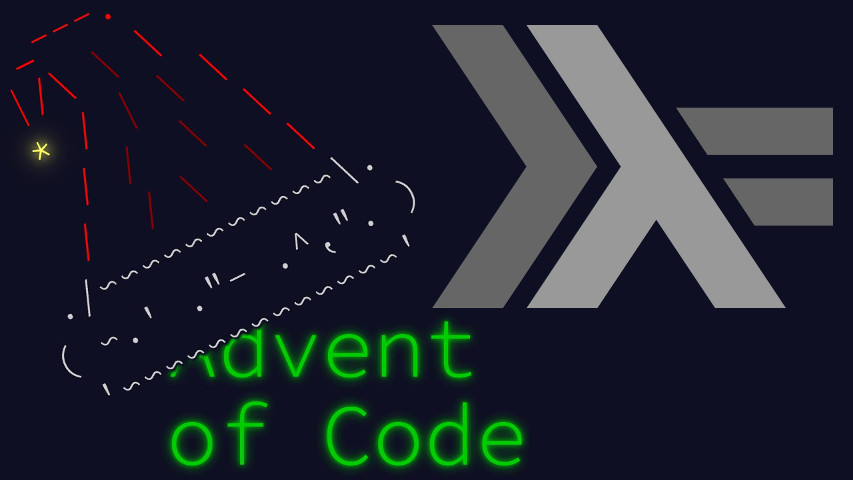The Advent of Code puzzle of the day, “Packet Decoder”, is a weird blend of parsing and evaluation. This post is literate Haskell; I’ve kept it short on the imports, you’ll thank me later.
import Control.Arrow ((&&&),first)
import Control.Monad (replicateM)
import Data.Char (digitToInt)
import Text.MegaparsecYeah, Megaparsec. I really didn’t go out for complexity here.
Okay, so the puzzle explicitly gives us the hexadecimal translation table: I won’t resist it. Here it is again, copy and pasted and after a few Emacs macros’ worth of processing.
deHex :: Char -> String
deHex '0' = "0000"
deHex '1' = "0001"
deHex '2' = "0010"
deHex '3' = "0011"
deHex '4' = "0100"
deHex '5' = "0101"
deHex '6' = "0110"
deHex '7' = "0111"
deHex '8' = "1000"
deHex '9' = "1001"
deHex 'A' = "1010"
deHex 'B' = "1011"
deHex 'C' = "1100"
deHex 'D' = "1101"
deHex 'E' = "1110"
deHex 'F' = "1111"
deHex _ = ""That last line is just there to make my life easier around the possibility of there being a newline at the end.
I write the output as Chars, but the main
wrapper will map it to Bools, so assume that’s what we have
down the pipe.
Next up, the puzzle’s datatypes. We’ve got a packet with a version
we’ll want to sum across the data structure. I’ll make it a type
parameter and use the good old autoderived Foldable. So read
a as Int.
data Packet a = Packet !a !(Payload a) deriving FoldableThen the payload. As far as part 1 goes, all we need to parse are
literals and a broad “operator” type with nested packets. Hence the
a type parameter reaching over to the payload.
data Payload a = Literal !Int | Operator !Op [Packet a] deriving FoldableNow the packet header is a straightforward decoding of fixed-width integers. The rest of the parsing is delegated to a specific parser. The power of monadic1 parser combinators…
type Parser = Parsec () [Bool]
packet :: Parser (Packet Int)
packet = do
v <- binary 3
t <- binary 3
Packet v <$> if t == 4 then literal else operator tParsing a single fixed-width integer is a simple matter of reading said width through and converting it.
binary :: Int -> Parser Int
binary n = readBin <$> replicateM n anySingleBinary conversion is your good old fold. As a toplevel function because I’ll re-use it shortly.
readBin :: [Bool] -> Int
readBin = foldl (\a b -> 2*a + fromEnum b) 0One of the two specific payload parsers is the one for literals. It
parses groups of 5 bits, ending on one that leads with a zero. The
middle line is a bit weirder than I’d like, it’s just there to patch up
the results from manyTill_ point-freely.2
literal :: Parser (Payload Int)
literal = Literal . readBin .
uncurry (++) . first concat <$>
manyTill_ (group True) (group False)
where group c = single c *> replicateM 4 anySingleDecoding is provided for by the same readBin function as
before.
Operator parsing is slightly trickier. There are two cases to disambiguate.
- We could be parsing any number of packets that fit within a fixed width.
- We could be parsing a given number of packets.
operator :: Int -> Parser (Payload Int)
operator o = Operator (toEnum o) <$> do
anySingle >>= \case
False -> do
l <- binary 15
recurse l (many packet)
True -> do
n <- binary 11
replicateM n packetThe recurse combinator… I expected to find directly in
Megaparsec, but didn’t. So here’s an interpretation of it.3
recurse :: Int -> Parser a -> Parser a
recurse l parser = do
(i,i') <- splitAt l <$> getInput
setInput i
r <- parser
setInput i'
pure rFor part 2, we’ve got to actually implement the operations. Here are the recognized types.
data Op = OpSum | OpProd | OpMin | OpMax | OpLit | OpGT | OpLT | OpEq deriving EnumA simple recursive evaluation function does the grunt work.
eval :: Packet Int -> Int
eval (Packet _ pl) = case pl of
Literal n -> n
Operator OpSum ps -> sum (eval <$> ps)
Operator OpProd ps -> product (eval <$> ps)
Operator OpMin ps -> minimum (eval <$> ps)
Operator OpMax ps -> maximum (eval <$> ps)
Operator OpGT [a,b] -> fromEnum (eval a > eval b)
Operator OpLT [a,b] -> fromEnum (eval a < eval b)
Operator OpEq [a,b] -> fromEnum (eval a == eval b)In normal code, not split in two parts as on AoC, I’d have the parser check those last three cases for the proper number of subpackets, so it wouldn’t take until so late to discover a relational operator has the wrong number of arguments. But that’s what we get for split goals.
The main wrapper is more interesting than usual: notice
how part 1 reduces to a simple sum call on the tree.
main :: IO ()
main = interact $ show .
fmap (sum &&& eval) .
parse packet "<stdin>" .
map (toEnum . digitToInt) .
concatMap deHexThis concludes today’s solution. See you tomorrow!
All parsers presented here could really be implemented as applicatives, but the syntax is just a bit too hairy. Cue ApplicativeDo comments.↩︎
Not that point-free style really brings legibility here. It’s AoC, I’m having fun.↩︎
And that one doesn’t cut it as an applicative. But it’s a combinator, I hope the conceptual purity gods will forgive me.↩︎



